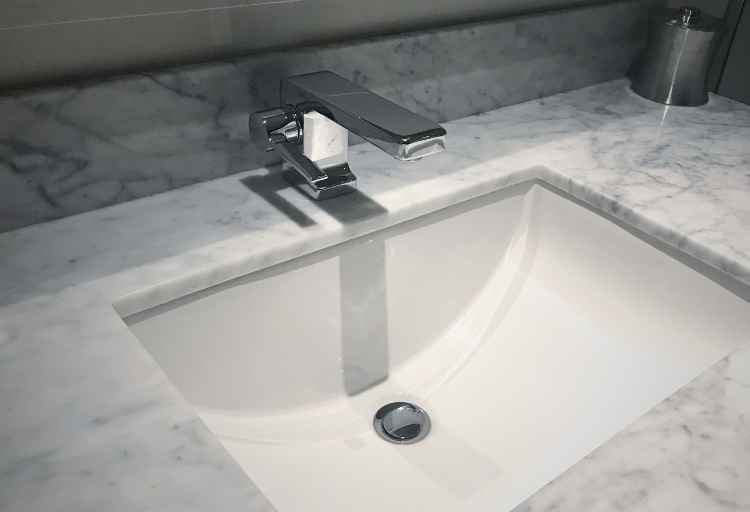Why Is My Bathroom Sink Gurgling
There are several possible reasons why your bathroom sink is gurgling, and it’s important to identify the cause in order to fix the problem effectively.
Why Is My Bathroom Sink Gurgling? One common culprit is a clogged drain or pipe, which can create air bubbles that result in a gurgling noise. Another potential cause could be ventilation issues, where air is not properly flowing through your pipes.
Water pressure problems or faulty plumbing fixtures may also contribute to the gurgling sound. In some cases, a sewer line blockage might be to blame for the irritating noise.
Understanding the source of the gurgling can help you take appropriate steps to resolve this issue and restore peace and quiet to your bathroom.

Contents
Key Takeaways
- Annoying gurgling sounds from a bathroom sink can indicate underlying plumbing problems.
- Possible causes of gurgling sounds include clogged drains or pipes, ventilation issues, water pressure problems, and faulty plumbing fixtures.
- Solutions to address gurgling sounds include using a plunger, drain snake, or baking soda and vinegar mixture for clogged drains, checking plumbing vents for blockages and ensuring adequate air circulation for ventilation issues, checking the water pressure regulator for damage and replacing if necessary for water pressure problems, inspecting plumbing fixtures for leaks, rust, or discoloration and replacing if needed for faulty fixtures.
- Regular maintenance is important to prevent sewer line blockages, which can cause gurgling sounds, slow drainage, foul odors, and sewage backups. Hiring a professional plumber for repairs and maintenance is recommended.
Clogged Drain or Pipe
Don’t worry, your bathroom sink is gurgling because it’s most likely due to a clogged drain or pipe! When it comes to fixing this issue, there are several drain-cleaning techniques you can try.
One common cause of clogged drains is the accumulation of hair and soap scum over time. To remedy this, you can use a plunger or a drain snake to dislodge the blockage.
Another option is pouring a mixture of baking soda and vinegar down the drain, followed by hot water. This chemical reaction can help break down any buildup in the pipes.
If these DIY methods don’t work, it may be necessary to call a professional plumber who can use more advanced tools and techniques to clear the clog.
Ventilation Issues
Ventilation issues can often cause strange noises and unpleasant odors in your home. When it comes to your bathroom sink gurgling, ventilation problems could be the culprit.
Insufficient airflow through the plumbing system can lead to a buildup of pressure, causing water to gurgle as it drains. This can also result in foul smells coming from the sink drain.
However, ventilation issues don’t just affect your comfort; they can also pose health risks. Without proper ventilation, moisture builds up, creating an ideal environment for mold growth. Mold not only damages surfaces but can also trigger allergies and respiratory problems.
To address this issue, consider checking if your plumbing vents are clear of debris or blockages and ensure that there is adequate air circulation throughout your home.
Water Pressure Problems
If you’re struggling with weak water pressure in your home, it’s important to identify the root cause and find a solution.
Low water pressure can be frustrating, especially when it affects everyday tasks like showering or washing dishes.
One possible cause of low water pressure is a malfunctioning water pressure regulator. This device is responsible for regulating the flow of water into your home, ensuring that it is at an optimal level. However, over time, these regulators can become worn out or faulty, resulting in reduced water pressure.
To determine if this is the issue, you can check the regulator by turning off your main water supply and examining its condition. If you notice any signs of damage or wear, it may be necessary to replace the regulator to restore proper water pressure throughout your home.
Faulty Plumbing Fixtures
To improve your water pressure, you may want to consider checking for faulty plumbing fixtures in your home. A leaking faucet can significantly affect the water flow in your bathroom sink, causing it to gurgle. Check if there are any visible leaks or dripping from the faucet and address them accordingly.
Another possible culprit for low water pressure is rusty pipes. Over time, pipes can corrode and develop rust, restricting the flow of water. Inspect your plumbing system for signs of rust or discoloration in the pipes and replace them if necessary.
Upgrading to newer fixtures can also help improve the water pressure by ensuring efficient water flow. Consider consulting a professional plumber who can assess and fix any faulty plumbing fixtures that may be affecting your bathroom sink’s performance.
Sewer Line Blockage
One possible cause of restricted water flow in your bathroom sink could be a blockage in the sewer line. Sewer line blockages can occur due to various reasons, such as debris buildup, tree roots infiltrating the pipes, or even collapsed pipes.
Regular sewer line maintenance is essential to prevent such blockages. Signs indicating a sewer line blockage include gurgling sounds from drains, slow drainage in multiple fixtures, foul odors coming from drains, and sewage backups. If you notice any of these signs, it’s crucial to address the issue promptly to avoid further damage or health hazards.
Hiring a professional plumber who specializes in sewer line repairs and maintenance can help diagnose and resolve the problem effectively. Remember that regular maintenance is key to preventing future issues with your bathroom sink’s water flow caused by sewer line blockages.
Frequently Asked Questions
Can a gurgling bathroom sink be caused by a leaky faucet?
Yes, a leaky faucet can cause gurgling in your bathroom sink. It is one of the common sink problems. The water leaking from the faucet can create air bubbles and result in a gurgling sound.
How can I fix a gurgling bathroom sink if it is not caused by a clogged drain or pipe?
To fix a gurgling bathroom sink when it’s not caused by a clogged drain or pipe, start troubleshooting the noises. Check the P-trap for blockages, ensure proper venting, and inspect the faucet assembly for any issues.
Are there any DIY methods to solve a gurgling bathroom sink due to ventilation issues?
To troubleshoot gurgling sinks and resolve ventilation issues, try these DIY methods. First, check the sink’s vent pipe for blockages. Next, ensure the vent pipe is correctly installed and not too far from the sink. Consider consulting a plumber if problems persist.
Can low water pressure cause a gurgling sound in the bathroom sink?
Low water pressure can indeed cause gurgling sounds in your bathroom sink. This is one of the common causes of such noises, as it disrupts the flow of water and creates air pockets that lead to gurgling.
What are the signs of a sewer line blockage other than a gurgling bathroom sink?
To maintain your sewer line and prevent plumbing issues, be aware of signs like slow drains, foul odors, gurgling toilets or sinks, and water backups. Regular maintenance can help avoid costly repairs.
Conclusion
So, if you’re experiencing a gurgling sound coming from your bathroom sink, there could be a few potential reasons.
It might be due to a clogged drain or pipe, ventilation issues, water pressure problems, or even faulty plumbing fixtures. In some cases, it could indicate a sewer line blockage which would require professional assistance to resolve.
Remember to address these issues promptly to prevent further damage and ensure the smooth functioning of your bathroom sink.
